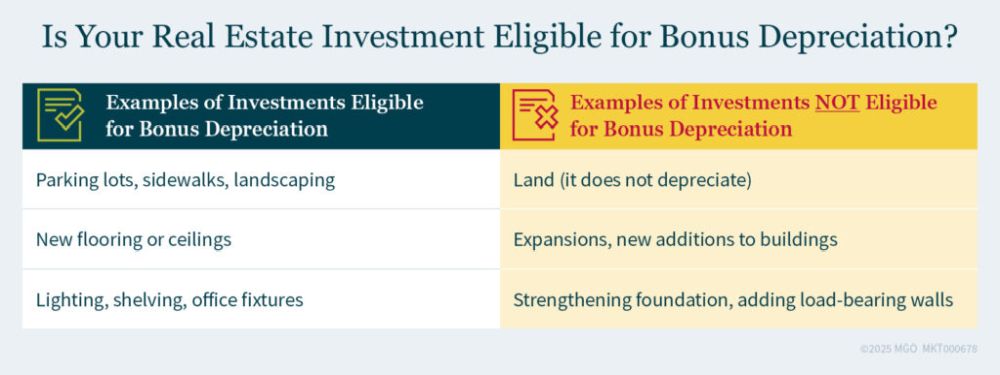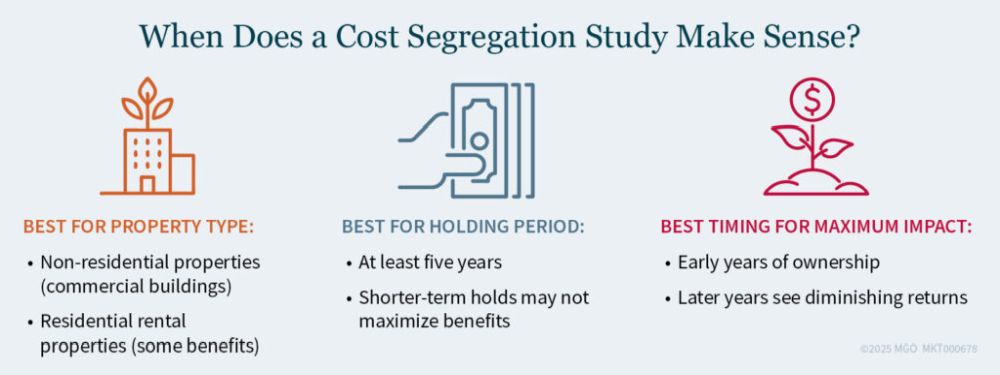- within Real Estate and Construction topic(s)
- within Real Estate and Construction topic(s)
- within Real Estate and Construction and Law Practice Management topic(s)
- with readers working within the Accounting & Consultancy industries
Key Takeaways:
- Bonus depreciation is a tax provision that allows you to deduct a large portion of qualifying real estate costs upfront, but it is phasing down each year and may be eliminated after 2026 unless Congress takes action.
- Key assets that qualify include land improvements like parking lots and sidewalks, as well as qualified improvement property (QIP), which covers interior upgrades to commercial buildings such as flooring, lighting, and internal HVAC systems.
- A cost segregation study can help you identify and reclassify property components with shorter depreciation periods, making more of your investment eligible for accelerated deductions.
—
As a real estate investor, bonus depreciation can be a powerful tool to reduce your tax liability and improve cash flow. But with recent changes — and the possibility of future adjustments — it's important to understand how this tax provision works and how it affects your investments.
What Is Bonus Depreciation?
Bonus depreciation is a tax provision that allows businesses to immediately deduct a substantial percentage of the purchase price of eligible assets in the year they are placed in service, rather than spreading the deduction over the asset's useful life. This accelerated depreciation is designed to encourage investment by improving cash flow and reducing tax liability.
Historically, bonus depreciation has been a tool used by Congress to stimulate economic growth. It was first introduced after the events of September 11, 2001, allowing a 30% immediate write-off for qualifying assets. Over the years, the percentage has fluctuated, with significant changes implemented through various legislative acts.
Evolution of Bonus Depreciation
The 2017 Tax Cuts and Jobs Act (TCJA) made a landmark change by increasing bonus depreciation to 100% for qualified property acquired and placed in service after September 27, 2017. This meant businesses could fully expense eligible assets upfront, providing a substantial tax benefit. However, the TCJA also outlined a phasedown schedule:
- 2023: 80% bonus depreciation
- 2024: 60% bonus depreciation
- 2025: 40% bonus depreciation
- 2026: 20% bonus depreciation
Absent further legislative action, bonus depreciation is set to phase out entirely after 2026.
Will 100% Bonus Depreciation Return?
In a March 2025 address to Congress, President Donald Trump stated:
"... as part of our tax cuts, we want to cut taxes on domestic production and all manufacturing. And just as we did before, we will provide 100 percent expensing. It will be retroactive to January 20th, 2025 ..."
Although he didn't explicitly mention bonus depreciation, this language alludes to the provision introduced in the 2017 TCJA (enacted under Trump's previous administration). If reinstated, 100% bonus depreciation could offer substantial tax benefits for businesses — but, for now, it remains a proposal subject to Congressional approval.
What Qualifies for Bonus Depreciation?
Bonus depreciation applies to assets with a useful life of 20 years or less under the Modified Accelerated Cost Recovery System (MACRS), the depreciation method used in the United States.
For real estate investors, bonus depreciation is particularly beneficial for two categories of assets:
- Land improvements – Assets like parking lots, sidewalks, and landscaping typically qualify.
- Qualified improvement property (QIP) – Interior improvements to commercial (non-residential) buildings placed in service after the original structure.

QIP: A Key Opportunity for Real Estate
QIP is one of the most significant areas where you, as a real estate investor, can leverage bonus depreciation. If you've made interior improvements to your commercial buildings after they've been placed in service, you may be sitting on a valuable tax strategy.
Examples of QIP include:
- Interior partitions and walls (excluding structural framework)
- Ceilings
- Flooring
- Electrical, plumbing, and internal HVAC upgrades
- Cosmetic enhancements for tenants
QIP excludes:
- Structural framework modifications
- Building enlargements
- Additions like elevators or escalators
Without bonus depreciation, QIP would be depreciated over 15 years. With bonus depreciation, investors can immediately expense a portion of the cost (40% in 2025, potentially 100% if new tax legislation passes), with the remaining cost basis being depreciated over the assets' useful life.
The Role of Cost Segregation Studies
Cost segregation is a strategic tax planning tool that allows property owners to identify and reclassify components of a building to shorter depreciation periods, accelerating depreciation deductions. Instead of treating the entire property as 39-year real property (for commercial buildings), a cost segregation study might reclassify components as five-, seven-, or 15-year assets, making them eligible for bonus depreciation.
For example, a study might identify:
- Five-year property: Carpet, decorative lighting, specialized electrical systems
- Seven-year property: Office furniture, equipment
- 15-year property: Landscaping, parking lots, fencing
Even as bonus depreciation phases down, cost segregation remains a valuable strategy — enabling you to identify assets that qualify for shorter depreciation lives, increasing tax benefits and improving cash flow. If bonus depreciation returns to 100%, cost segregation studies will likely increase as investors seek to maximize depreciation benefits for qualified improvements on newer properties.

Key Considerations for Real Estate Investors Moving Forward
As a real estate investor or professional, staying informed about these tax provisions is vital. Here are some key considerations:
- Legislative changes: While Trump has proposed restoring 100% bonus depreciation retroactively to January 2025, this is not yet law. Investors should plan for the current step-down schedule but stay alert for potential changes.
- Timing of asset acquisitions and improvements: If 100% bonus depreciation is reinstated, it could significantly impact investment strategies. Investors planning major renovations or acquisitions may benefit from waiting for legislative clarity.
- Election options: Bonus depreciation is automatic unless investors elect out, which can be done separately for each asset class life (five-year, seven-year, 15-year). Work with a tax professional to determine if long-term tax strategies favor traditional depreciation methods.
- State tax situations: Bonus depreciation treatment varies by state. Some states conform to federal rules, while others require alternative calculations. State policies can change annually, so knowing your state's approach is crucial for accurate tax planning.
What's Next for Bonus Depreciation?
If Congress reinstates 100% bonus depreciation, it could impact your tax planning for 2025 and beyond. Whether you're acquiring new properties, making improvements, or considering a cost segregation study, understanding these changes can help you maximize deductions and optimize your real estate investments.
How MGO Can Help
Navigating bonus depreciation rules can be complex, but you don't have to do it alone. Our Real Estate team has extensive experience helping businesses and investors navigate bonus depreciation — including determining qualifying assets and providing cost segregation services.
We can help you assess how bonus depreciation could impact your portfolio and identify opportunities to reduce your tax burden and increase your cash flow. Reach out to our team today to explore your options.


